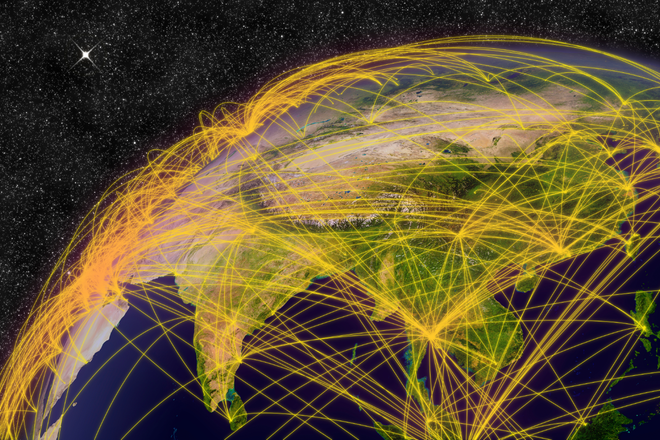If you ask Western exerts which country is winning the technology race, the majority will point towards China, with a mixture of envy and trepidation. The world’s third-largest nation by landmass – behind only Russia and Canada – is in a league of its own in terms of tech adoption and innovation.
The Communist Party of China has ruled since 1949, and has a firm grip on the country’s army, police force, and media. This makes it hard for outsiders to gauge the extent of its tech advancements. And with the government implementing initiatives like the Social Credit System (SCS, a host of ethical issues arise.
“The leading edge of financial services technology is now in the East, not the West. If that technology arrives on these shores – and there are arguments and counterarguments as to whether it will, or not – we are all at risk of disruption,” says Alan Patefield-Smith, Chief Information Officer of the UK financial services company Admiral Group. “If Amazon, Apple, or Google expanded into fintech, they would likely gobble up market share thanks to their data-driven business models. But if the tech capabilities of China were to appear in the West, it would mean a whole other level of disruption altogether.”
“The US military phrase VUCA – volatility, uncertainty, complexity, and ambiguity – captures the world in which we now operate,” Patefield-Smith adds. He believes that professionals working in the financial services industry must have a more agile mindset and consider how Chinese technologies might usurp current ways of operating. “We haven’t seen super apps in the West yet, but this technology would quickly disrupt the market if introduced. It’s essentially a smartphone application into which a company can drop any other app. The smartphone is just the host- once it’s on your phone, it’s all about the customer experience, and all the other apps pile in, like an ecosystem. If it catches on in the West, there’s your next Amazon.”
Super apps: the next evolution of digital technology
Super apps are quick, cheap, and simple, and enable an incredibly personalized customer experiences across a wide range of industries, such as banking, insurance, electricity, and messaging. The average American adult spent around four hours daily on their mobile device in 2021, according to eMarketer, so the convenience of a super app would certainly be appealing.
“They could enhance the customer relationship because of all the data. It will be the next evolution of digital technology, and in China, they are already at that point. These central applications where customers can buy most products and services are made possible thanks to the dynamic over in China,” says Patefield-Smith. But realistically, would super apps be allowed in the West, considering the data-driven power they would wield? “It happens [in China] because the government has the mandate, but I’m not sure whether sooner or later someone will figure out how to do over here,” he adds.
Ironically, as screen time increases in the West, it is being restricted in China to curb addiction to online gaming. In August 2021 a Chinese state media outlet labeled online games “spiritual opium.” Later that month, the National Press and Publication Administration informed state-run news agency Xinhua that online gamers aged under 18 would be restricted to one hour of gaming on Fridays, at weekends, and during holidays . Little is known in the West about whether this one-hour limit is being monitored and enforced by the state.
“There is lots of stuff going on that we don’t hear about in the West. We find it abhorrent that people can be rated in this way but, in China, the privacy laws are very different.”
Gerd Leonhard, The Futures Agency
When the Chinese government announced plans to launch the SCS in October 2017 – effectively testing the trustworthiness of its 1.5bn citizens – for Western observers it evoked popular dystopian television series Black Mirror. The policy aimed to build a culture of “sincerity” and “forge a public opinion environment where keeping trust is glorious.”
Futurist Gerd Leonhard, speaking from the Zürich headquarters of his organization, The Futures Agency, refers to it as an extension of the Great Wall of China. “Even before SCS, China had a scoring system called Open Sesame, where if a citizen wanted anything – from a loan to a house – they have to have a good score on the 1 to 100 scale. Chinese people in the big cities have found a way around this, though, and there is lots of stuff going on that we don’t hear about in the West. We find it abhorrent that people can be rated in this way but, in China, the privacy laws are very different. Simply put, privacy doesn’t mean a thing over there,” he says.
Command and control – in theory
That desire for control is the primary reason why decentralized cryptocurrencies have failed to gain traction in China, at least in theory. Pressure has ratcheted up on the country’s crypto proponents in recent years, while last September, no one was surprised when the government declared all crypto transactions illegal and banned citizens from working for crypto-related companies.
There is one significant reason for China’s crypto crackdown: the vast majority of bitcoin is mined there, driving up energy demand and making it harder for the country to achieve its target of net-zero emissions by 2060. Bitcoin’s energy consumption currently surpasses that of many countries combined.
“With two-thirds of bitcoin mining taking place in coal-heavy regions like China where energy costs are subsidized, the resultant carbon footprint is huge. Over the long term, it’s difficult to see how this is consistent with a transition to a low-carbon economy,” says David Sneyd, Vice President in BMO Global Asset Management’s Responsible Investment team.
As China’s government continues to funnel investment into advanced technologies and leverages the vast quantities of data from its citizens, many Western tech experts – including those in the financial services industry – will be watching how things develop with interest, and possibly a tinge of jealousy.












